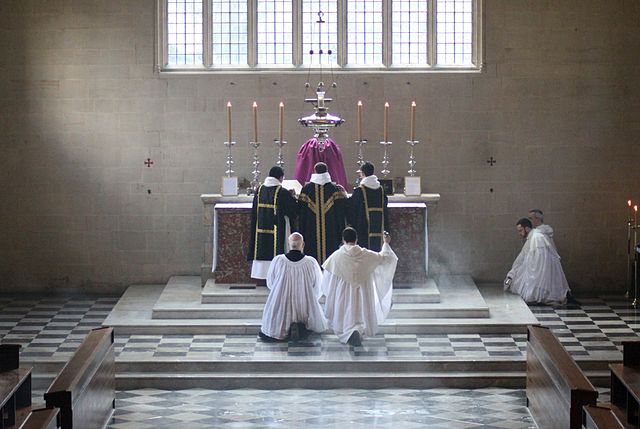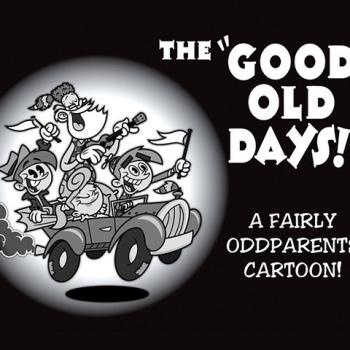***
***
This comes from a vigorous Facebook discussion on a page other than my own.
* * * * *
Younger folks (at least of a certain, “serious” sort) are always quick to reject nonsense; so they are rejecting liberalism and liturgical mediocrity. All perfectly predictable. It’s always been that way (“can’t teach an old dog new tricks”). But Catholics shouldn’t be divided by mere age; it’s absurd.
Sure, the younger ones should be in the forefront of progress, but rest assured, they’ll make the same stupid mistakes that everyone else makes, being human beings. They just don’t know it yet, because that’s the nature of youthful idealism (and in many ways, thank God for it). Generations are not a barometer for anything. People are people, and if the youngsters don’t make the same dumb mistakes their parents made, then they’ll assuredly find others just as bad to take their place.
Also, as long as the internal problems that “traditionalists” have (and all groups have difficulties and negative tendencies to be overcome) are (in my opinion) rationalized away as merely a “generational” problem, nothing will be improved. It has to be squarely faced as stuff that tends to be generated within “traditionalism,” for whatever reason. It’s a sin problem, not an age problem. The latter “hypothesis” is far too simplistic.
* * *
I think the labeling discussion is very good and is bearing significant fruit. I’ve removed “trad” from my newly coined term for the radicals: radical Catholic reactionaries (RadCathRs for short). Folks were calling for that. I responded and did it, and I think it’s a net gain.
Mark Shea seems to have started using “reactionaries” now: basically the same nomenclature as mine: I just wanted to make sure “Catholic” was in there and “radical” retained. So both he and “Torquemada”, who were in on the early usage of “radtrad” (Sandra Miesel being the one who coined it), have now suggested that others drop “radtrad” and they have started using different words.
The trend line is clear. Now “traditionalists” are calling for a cessation of “neo-Catholic” and other inane and inapplicable terms for non-trads and some (“Bonaventure”) are even saying that “traditionalist” shouldn’t be used any longer. I’m very encouraged by it.
I don’t see the self-label “traditionalist” going away anytime soon, but that type of thinking evidences a self-reflection and awareness of labels and what they do, that I’ve been writing about for 15 years, so I’m ecstatic to see that, too.
David Palm, friend and “traditionalist” observed:
I’m all for the current rapprochement between traditionalists and…..what shall we say?….fill-in-the-blank…. Truly I am. But I continue to think that the debate and, to a lesser extent, certain labels are necessary because there remain distinctly different approaches to the Faith. We’re not talking about “liberals”, who have abandoned the Faith, so let’s set that on one side. By all means sign me up for treating others with respect, hanging out, praying and drinking beer together. I do wish there was a forum in which we could discuss these things more seriously.
* * *
The apologist (as I’ve explained before in the discussions about these labels) is concerned with identifying errors and preventing others from falling into them. That’s our method and motivation as well. That requires (quite clearly) labels because you can’t spend a whole paragraph defining some belief system every time it’s mentioned. That’s why we have labels in the first place: to shorten discourses by about 50% or more.
So when some folks say, “just don’t use a label,” I say that it’s quite impossible (when doing apologetics). It’s not necessary when addressing someone first person, but it is when writing about belief-systems and distinguishing them from others, in an effort to educate readers who are often confused about the different camps.
And it all started (sorry! — but it’s undeniable) when you guys insisted on calling yourselves “traditionalists.” That set up a scenario with different camps (or “tribes” or “tribalism” — as some are fond of saying). Once that is in place, then there has to be a name for those of us who don’t use the label or worship at the TLM. Most of those labels have been quite insulting (and equally silly and ridiculous); now we’re finally getting to a place where many of us on both sides are trying to get past that, which is very refreshing to see.
I remember when (about 6-7 years ago) a “traditionalist” said he would stop calling me a “neo-Catholic” after I explained the traditional nature of my parish and my own worship practices. I was touched by that, and it changed the entire tone of the several friendly dialogues we later engaged in (many of them now paraphrased in my 2012 book, Mass Movements). That’s how I reacted to not being called by a false label, so I can understand the sensitivity among “traditionalists” too: as we all have that in common: we want to be called what we wish to be called and not some label that we don’t feel applies to us at all.
But (getting back to my main point) as an apologist, I looked out and saw you guys calling yourselves “traditionalists”; and at the same time there was a far more radical group that called themselves the same name but was plainly quite different. Thus, they had to have a different name. For me now, it is “radical Catholic reactionary.” “Reactionary” has an edge, but they’re gonna have to live with it. It’s a lot less objectionable than what these people say about Holy Mother Church and many of her obedient children. And it’s literally accurate, as far as I’m concerned.
* * *
I tend to think it is mostly the emotions of being the “outsider” and treated as second-class citizens, that “traditionalists” have felt, that cause such things as the strong negative reactions to the two Catholic Answers Live shows on RadCathRs. Thus, they saw the term “radtrad” and they thought, “that means they’re saying all traditionalists are radical wackos,” when in fact we have made it very clear that we meant “a tiny number of fringe trads are wacko.”
Now my own change of mind is to classify the wackos as not “traditionalists” at all (rather than a fringe wing). I hope it is not just an abstract distinction, or one only on paper, and that it is real, because many times there is a lot of overlap in many different ways (seen in links, Facebook friends, “likes,”etc.). But sometimes language can help frame a desired reality.
* * *
I’m not trying to “reach out” to radical Catholic reactionaries. I’m reaching out to those who are tempted to follow their errors. The radicals won’t listen to me; they will only talk to “traditionalists,” who half-sympathize with who knows how much of their viewpoint . . .
Again, that is the particular goal of the apologist. We’re concerned with error and preventing others from falling into it, and defense of Catholic truth. The concern of many “traditionalists” (especially younger ones) is, on the other hand, community-building over beer after Mass, and PR and movement-building and proper conceptualizing and worldview pondering for “traditionalists,” which is fantastic.
I don’t condemn those worthy endeavors, yet some “traditionalists” seem to have a need to run down (or at any rate, minimize) apologetics (an attitude I’ve seen time and again). We seem to be a very popular whipping boy. I have a theory as to why that is, or most likely partially why it is, but I’m not gonna get into it here!
We all need to live and let live. Allow the apologists to do their thing without running them down, when there is no need to: it’s apples and oranges. I have no corresponding need to run down the endeavors noted above. And that’s because I follow St. Paul’s spirit in what he was saying in 1 Corinthians 12: different parts of the body: we should reinforce each other and rejoice in different gifts and roles, not puff our own role up at every turn.
* * *
It’s high time we all get along better, with our society going down the toilet all around us. The worse it gets, the more we’ll have in common, including with our Orthodox and Protestant brethren. I used to love how the pro-life rescue movement was so ecumenical. I was still Protestant when I was part of that, and I thought it was great that we were all out there working together.
I think legitimate ecumenism is applicable to divisions within the Church as well as our differences with non-Catholics. I’m happy to vigorously apply Vatican II, in order to get along better with my traditionalist friends. :-) :-)
I’m particularly excited about the increasing constructiveness and mutual respect of trad / non-trad discussion. This will bode well for the Church.

















